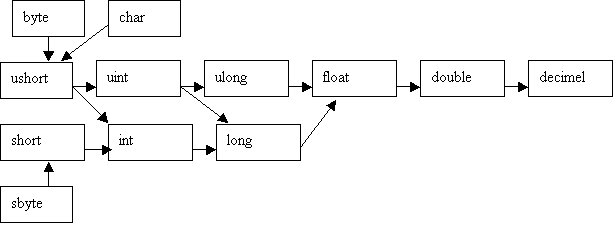Type conversion is a processof convetring one type of data to another. There are three ways of doing it, namely implicit explicit and user defined.
-
Implicit : If one type of data is automatically converted into another type of data, it is known as implicit conversions. There is no loss of data resulted from implicit conversion.
-
Explicit : when you force the data to convert from one form to other.But explicit conversion is a forced conversion and there may be a data loss.
-
User defined:

Implicit Conversions
in C#
The implicit
conversions can occur in a variety of situations like
function invoking, cast expressions, assignments etc.
The implicit conversions can be further classified
into different categories.
Implicit Numerical
Conversions
The possible
implicit numerical conversions in C# are shown below.
int y = 25;
x = y; //implicit numerical
conversion
An implicit enumeration
conversion permits the decimal
integer literal 0 to be
converted to any enum type.
Implicit Reference Conversion
The possible implicit reference
conversions are
-
From any reference type to
object.
-
From any class type D to any
class type B, provided D is
inherited from B.
-
From any class type A to
interface type I, provided A
implements I.
-
From any interface type I2 to
any other interface type I1,
provided I2 inherits I1.
-
From any array type to
System.Array.
-
From any array type A with
element type a to an array
type B with element type b
provided A & B differ only in
element type (but the same
number of elements) and both a
and b are reference types and
an implicit reference
conversion exists between a &
b.
-
From any delegate type to
System.Delegate type.
-
From any array type or
delegate type to
System.ICloneable
- From null type to any reference type.
Boxing Conversions
Boxing is the
conversion of any value type to object type. Remember
that boxing is an implicit conversion. Boxing a value
of value type like int consists of allocating an
object instance and copying the value of the value
type into that object instance. An example for boxing
is shown below.
int x = 10;
object o = x; //Boxing
if(o is int)
Console.WriteLine(“o contains int type”);
A boxing
conversion making a copy of the value being boxed. But
when we convert a reference type to object type, the
object continues to reference the same instance.